To stop biting your nails, identify your triggers, like stress or boredom. Use deterrent products like bitter-tasting nail polish, and keep your nails trimmed short. Engage in replacement activities like using fidget tools or other creative outlets to keep your hands busy. Regular manicures can improve your nail appearance and reduce the urge to bite. Seize small victories in your journey, and find out more strategies to help you break this habit effectively.
Key Takeaways
- Identify and track your triggers through mindfulness and journaling to understand when and why you bite your nails.
- Use deterrent products like bitter-tasting nail polish and keep nails trimmed to minimize opportunities for biting.
- Replace nail biting with engaging activities such as fidget tools, knitting, or drawing to occupy your hands.
- Implement stress management techniques, like yoga and deep breathing, to help reduce anxiety and urges to bite nails.
- Seek professional help if nail biting persists, considering therapy options or consulting a dermatologist for nail care advice.
Understanding the Habit of Nail Biting
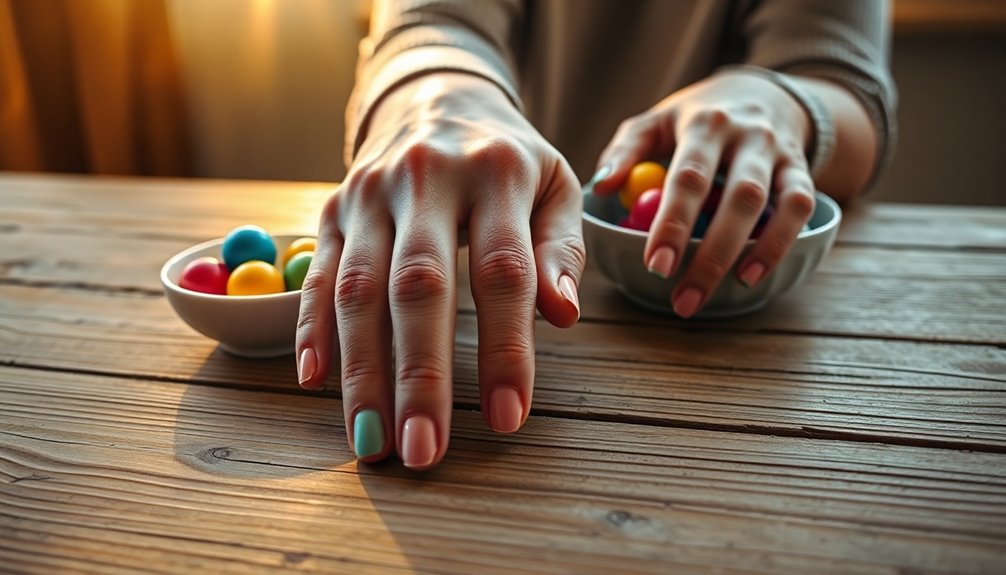
Many people find themselves biting their nails without even realizing it. Nail biting often starts in childhood and can continue into adulthood, fueled by emotional triggers like stress and anxiety.
You mightn't notice when you start this habit, but being mindful of your behaviors is vital. Identifying what sets off your nail biting can help you develop effective coping strategies.
It's important to pay attention to your surroundings and feelings when the urge arises. By practicing mindfulness, you can become more aware of the habit and its triggers, allowing you to take proactive steps to curb it. Engaging in professional help can also provide valuable support in managing underlying emotional issues.
With commitment and self-awareness, you can break free from the cycle of nail biting and promote healthier habits.
Health Risks Associated With Nail Biting

Nail biting isn't just a harmless habit; it can lead to serious health risks. When you bite your nails, you introduce harmful bacteria and viruses into your body, increasing susceptibility to illness.
The act can cause soreness and damage the tissue around your nails, potentially leading to scarring or infections of the nail bed. Repeated nail biting might even chip or crack your teeth, which can create jaw problems over time.
Additionally, this habit can disrupt normal nail growth patterns, leaving you with irregular nails. It's important to recognize that nail biting has real consequences for your health, making it vital to address this habit before it leads to more serious complications. Cold medications may also increase your risk of infections, as some can lower your immune response.
Identifying Triggers for Nail Biting
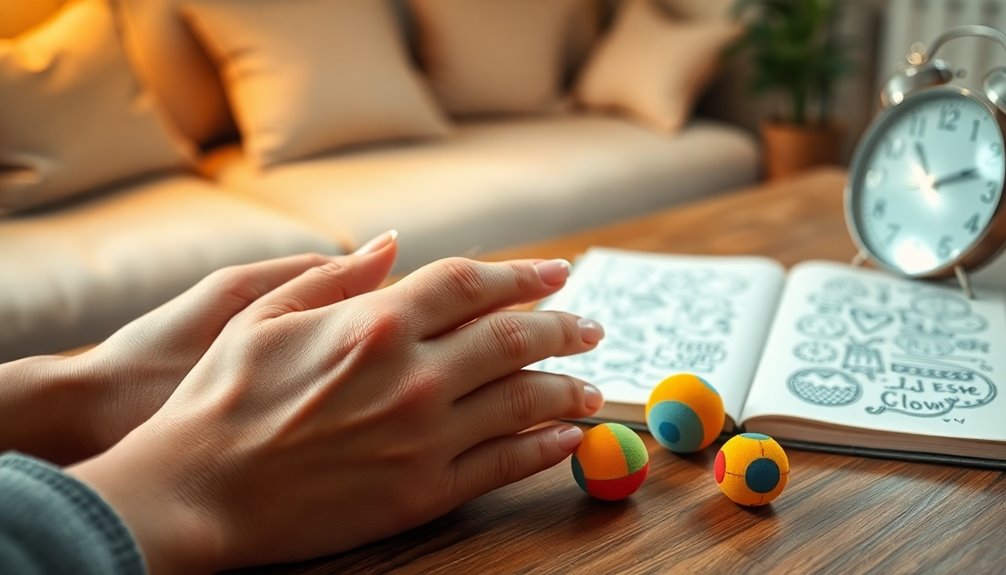
Have you ever noticed what prompts you to bite your nails? Identifying triggers is essential in your journey to stop this habit. Physical triggers, like hangnails or rough cuticles, can ignite the urge to bite.
However, emotional triggers often play a larger role; stress, anxiety, or even boredom can lead you to reach for your nails. Enhancing your emotional awareness helps you understand these connections.
Additionally, specific settings—such as watching TV or being at work—can also increase nail-biting behavior. To gain insight, consider keeping a journal to track when you bite your nails. This practice will help you pinpoint patterns and triggers, ultimately enabling you to break the cycle and adopt healthier coping mechanisms. Engaging in active listening and empathy can also help you address emotional triggers more effectively.
Effective Strategies to Stop Biting Nails
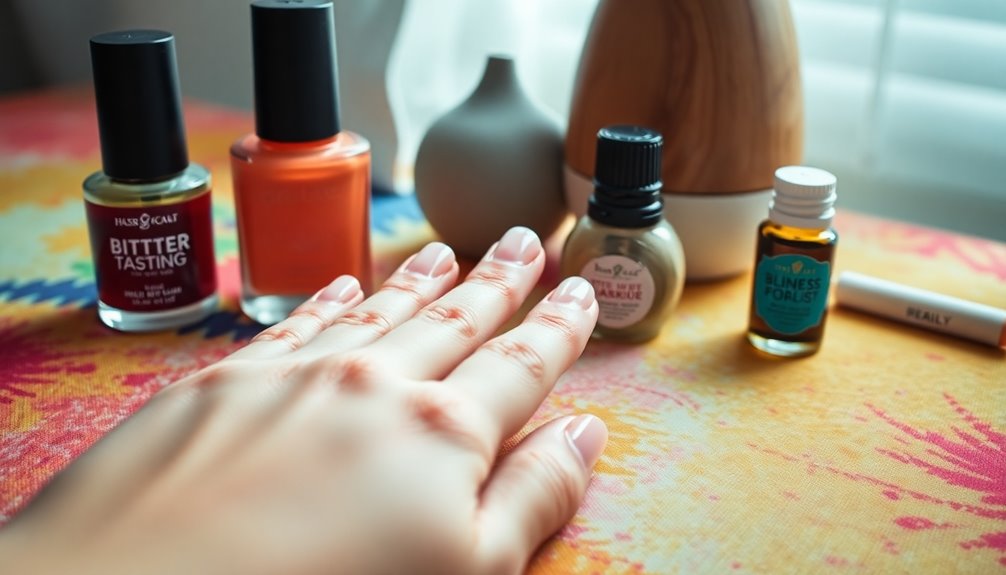
To effectively stop biting your nails, start by identifying your triggers and patterns. Using deterrent products like bitter-tasting nail polish can help curb the habit, while replacing nail biting with positive activities keeps your hands busy. Additionally, practicing stress management techniques can help reduce the urge to bite your nails when feeling anxious or overwhelmed.
Identify Triggers and Patterns
Understanding your triggers and patterns is essential for breaking the nail-biting habit. Start by recognizing physical triggers, like hangnails or rough cuticles, which you can manage proactively.
Next, identify emotional triggers such as stress or boredom. Journaling can help you monitor thoughts and situations that lead to nail-biting episodes.
Consider these strategies to redirect your urges:
- Keep a stress ball or fidget toy nearby.
- Create a calming routine to manage anxiety.
- Avoid environments where you often bite your nails.
Additionally, managing behavioral challenges in seniors can provide insights into how to cope with stressors that may contribute to nail-biting.
Use Deterrent Products
Many people find that using deterrent products can be a game-changer in their battle against nail biting. These products, like bitter-tasting nail polish, leave an unpleasant taste that discourages the habit. Users often see immediate results, with improvements within days. Here's a quick guide to help you choose the right product:
| Type of Product | Key Features | Notes |
|---|---|---|
| Bitter Nail Polish | Safe for kids & pets | Avoid harmful chemicals |
| Dual Bottle Formula | Customizable bitterness levels | Adjust to your preference |
| Fast-Drying Formula | Quick application | Less chance to bite while drying |
| Long-lasting Formula | Extended protection | Apply consistently |
| Easy to Apply | User-friendly applicator | Make it part of your routine |
With consistent use, you can effectively stop biting your nails! Additionally, incorporating herbal tea into your daily routine may help reduce stress and anxiety, which are often triggers for nail biting.
Replace With Positive Habits
Using deterrent products can help you break the nail-biting habit, but replacing it with positive behaviors often leads to more lasting change.
Keep your hands busy with activities that redirect your urge to bite nails. Here are some effective strategies:
- Use stress balls or fidget toys to engage your fingers.
- Establish a nail grooming routine to promote care and reduce temptation.
- Chew gum or snack on healthy foods to keep your mouth occupied.
Incorporating mindfulness practices can also enhance your awareness of when and why you bite your nails. Educational and skill-building toys can provide a fun way to keep your hands engaged while also promoting learning.
Experiment with different fidgeting options, like worry stones, to find what works best for you.
Replacement Activities to Occupy Your Hands
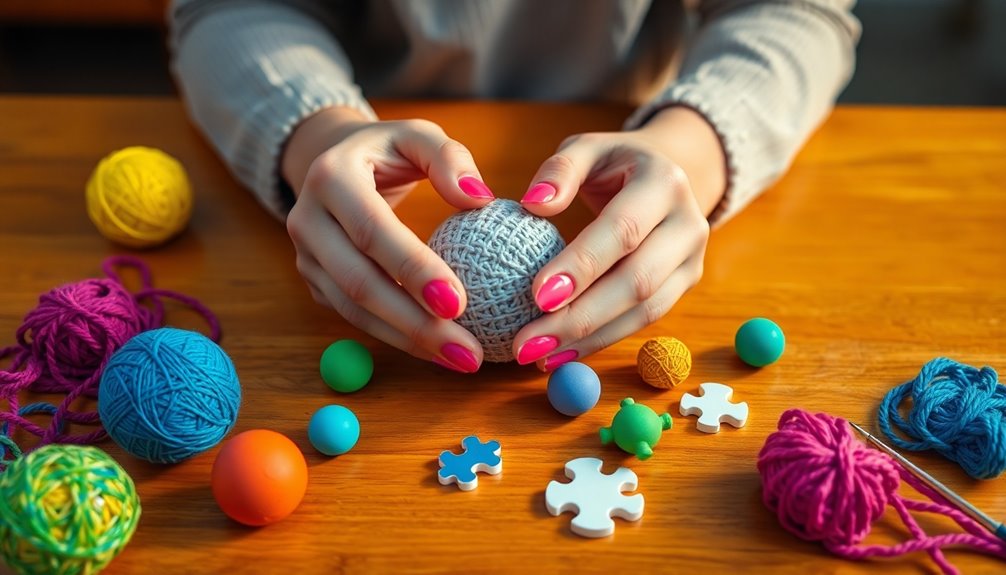
To help curb your nail-biting habit, consider using fidget tools and toys to keep your hands engaged.
Stress-relief activities, like squeezing a stress ball or manipulating a fidget spinner, can channel your nervous energy in a healthier way.
Fidget Tools and Toys
When you feel the urge to bite your nails, fidget tools and toys can be a game-changer. By keeping your hands busy, these items can help break the nail-biting habit and provide a satisfying tactile experience.
Here are some great options to take into account:
- Stress ball: Squeeze it to release tension and distract yourself from nail biting.
- Fidget spinner: Spin it for a quick and engaging way to keep your hands occupied.
- Textured rings: Wear them to enjoy a sensory experience that diverts your attention.
Creating a fidget toolkit with various tools guarantees you always have an alternative to reach for. Additionally, using different textures can further enhance your fidget experience, making it even more effective in reducing nail-biting tendencies.
Stress-Relief Activities
Finding effective stress-relief activities can greatly help you combat the urge to bite your nails. By keeping your hands busy, you can redirect your focus and help stop this habit. Here are some activities to think about:
| Activity | Benefit |
|---|---|
| Squeeze a stress ball | Occupies hands |
| Fidget spinners | Manages anxiety |
| Deep breathing | Reduces stress levels |
| Knitting or drawing | Engages creativity |
| Yoga or tai chi | Promotes overall mental health |
Incorporating these stress-relief activities into your daily routine can considerably reduce your desire to bite your nails. Additionally, engaging in activities like crochet styles for locs can provide a creative outlet that keeps your hands occupied. So, give them a try, and you'll likely notice a positive change in your habits!
The Role of Mindfulness in Breaking the Habit
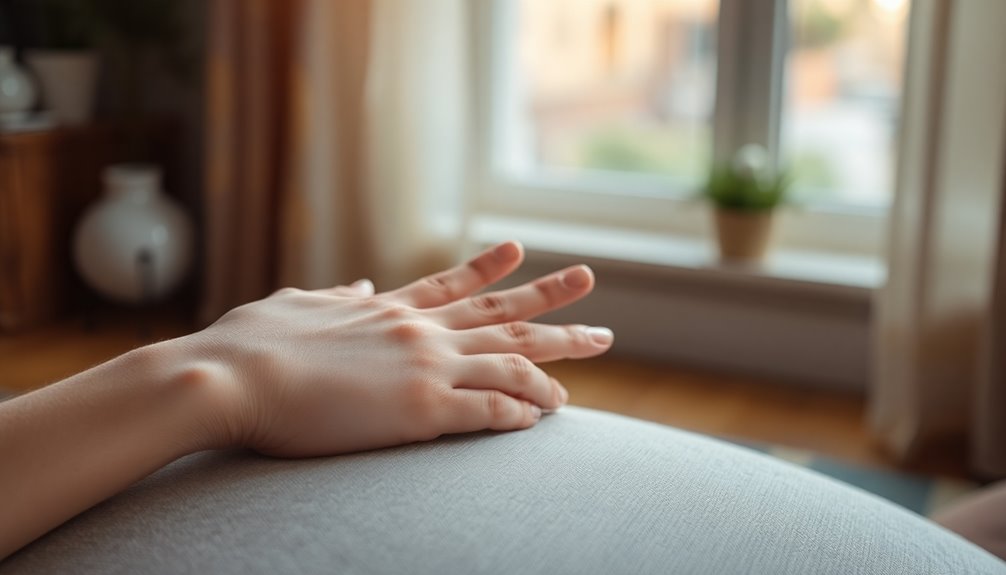
Mindfulness plays an essential role in breaking the habit of nail biting by helping you recognize and confront your triggers. By practicing mindfulness, you can observe your thoughts and feelings without judgment, making it easier to identify those moments when you feel the urge to bite your nails.
Techniques like deep breathing or meditation can also reduce anxiety and stress, common emotional triggers for nail biting. Mindfulness practices can enhance your ability to improve self-control, which is crucial in resisting habits like nail biting.
Here are some ways to incorporate mindfulness into your daily routine:
- Keep a journal to track nail-biting episodes and identify patterns.
- Practice deep breathing exercises when you feel the urge.
- Create a moment of pause before responding to triggers.
With regular practice, mindfulness can improve your self-control and help you resist the urge to bite your nails.
Preventive Measures to Deter Nail Biting

To effectively deter nail biting, it is crucial to adopt preventive measures that address both the physical and psychological aspects of the habit. Start by keeping nails trimmed short; with less nail to grip, the urge to bite decreases. Applying bitter nail polish provides an unpleasant taste, making you think twice before biting. Regular manicures can also enhance your nails' appearance, reinforcing a sense of care that diminishes the urge. Additionally, consider wearing gloves or using nail stickers to create a physical barrier. Identifying triggers and developing coping strategies will further help reduce episodes.
| Measure | Description | Benefits |
|---|---|---|
| Bitter Nail Polish | Apply to nails for a bad taste | Discourages biting |
| Keep Nails Trimmed | Regularly cut nails short | Reduces gripping opportunity |
| Wear Gloves | Use gloves to block access | Creates physical barrier |
| Regular Manicures | Schedule manicures for care | Enhances appearance and pride |
User Experiences With Anti-Nail Biting Products
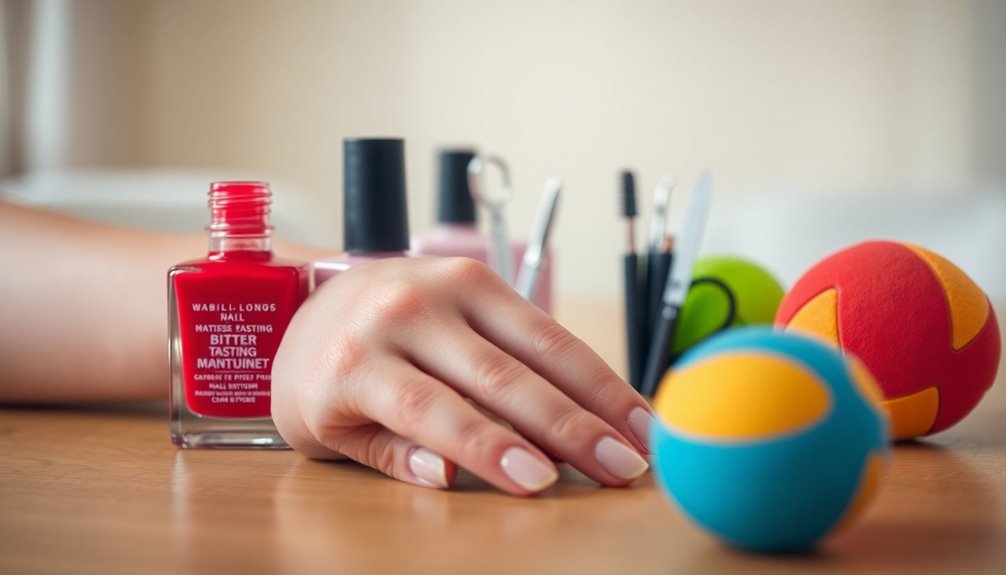
How effective are anti-nail biting products in breaking the habit? Many users find them surprisingly effective, especially those with a bitter taste.
You'll appreciate the convenience of roll-on and brush-on formulas, which work well alone or over nail polish. Some parents even report improvements in their children's thumb sucking habits after just a few applications.
Here's what you might expect:
- Immediate deterrent effect with bitter formulas
- Easy application and quick drying time
- Mixed results, but many find long-term success
Patience and consistency are key to stop biting. While results can vary, many users swear by these anti-nail biting products as the best method after trying numerous alternatives.
Seeking Professional Help for Persistent Nail Biting

If nail biting continues to be a challenge despite your best efforts, seeking professional help can be an essential step toward breaking the habit.
Consulting a doctor can help identify any underlying psychological issues that may be contributing to your behavior. A mental health professional can introduce you to behavioral therapy, such as cognitive-behavioral therapy (CBT), which effectively addresses the triggers and thought patterns linked to nail biting.
Group therapy can also offer valuable support, allowing you to connect with others facing similar struggles. Additionally, dermatologists can treat skin or nail infections caused by biting and advise on care for damaged nails.
Working with a professional can provide the tools you need to gradually stop biting, one nail at a time.
Celebrating Small Victories in Your Journey to Stop Biting Nails
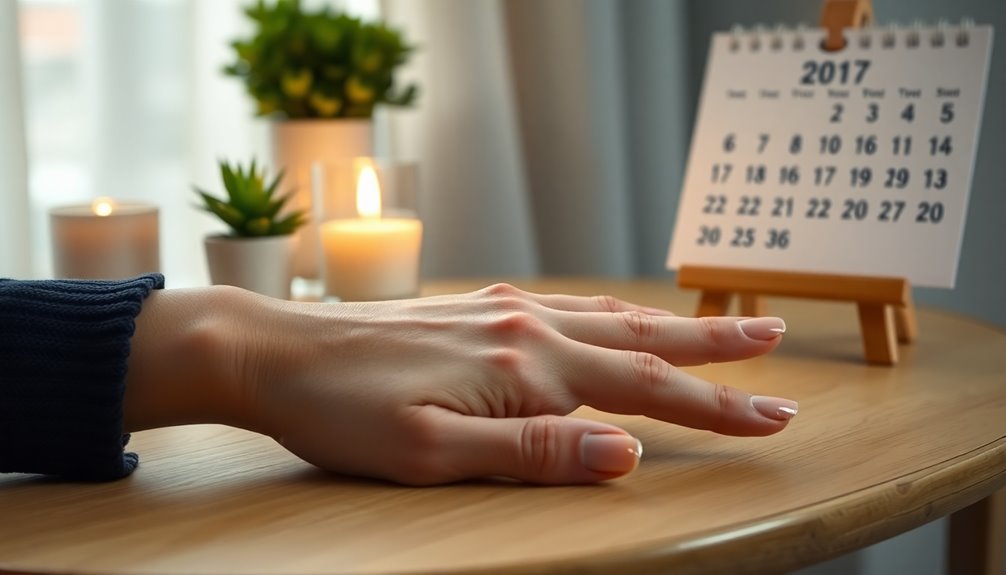
As you work to stop biting your nails, celebrating small victories can greatly enhance your motivation and commitment. Recognizing your progress, no matter how minor, reinforces your efforts and builds positive habits.
Here are some ways to celebrate:
- Keep a visual progress chart to track each successful day without biting.
- Treat yourself after reaching milestones, like a week of success, with something you enjoy.
- Share your achievements with friends or family for encouragement and accountability.
These actions not only reward your commitment but also remind you of the benefits gained, like healthier nails.
Frequently Asked Questions
How Can I Stop Biting My Nails?
To tackle the habit, start by identifying what triggers you to bite your nails.
Once you know your triggers, try to replace the biting with a different activity. Keep your hands busy with stress balls or fidget toys.
You can also apply a bitter-tasting polish to remind you to stop. Trim your nails short to reduce temptation, and celebrate small wins as you make progress.
You've got this!
What Is the Replacement Behavior for Nail Biting?
When you're looking for a replacement behavior for nail biting, consider engaging in activities that keep your hands busy.
You could try using stress balls or fidget toys to redirect your urge. Knitting or doodling can be great alternatives too.
Whenever you feel anxious, squeeze that stress ball instead.
Plus, tasks that require fine motor skills, like solving puzzles or playing an instrument, can help diminish the desire to bite your nails.
What Is the Therapy for Nail Biting?
Imagine you're in a therapy session, discussing your nail-biting habit.
Cognitive-behavioral therapy (CBT) can help you understand the thoughts and feelings that trigger this behavior. You might learn to identify stressors and replace biting with healthier alternatives, like squeezing a stress ball.
If anxiety's a factor, mindfulness techniques can guide you to manage those emotions.
Seeking professional help guarantees you get personalized strategies to effectively tackle your habit.
Conclusion
Breaking the nail-biting habit might feel overwhelming, but remember, every small victory counts. As you replace those anxious moments with healthier activities, you'll find your confidence growing alongside your beautiful nails. Embrace the journey, knowing that progress often comes with setbacks. Just as a flower blooms through struggle, your determination can transform your hands into a canvas of resilience. So, take a deep breath, keep pushing forward, and watch as the change unfolds, one nail at a time.









